| 1 |
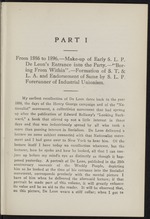 |
“...Forerunner of Industrial Unionism.
My earliest recollection of De Deon dates back to the year
1886, the days of the Henry George campaign and of the Na-
tionalist movement, a collectivist movement that had sprung
up after the publication of Edward Bellamys Looking Back-
ward, a book that stirred up not a little interest in those
days and that was industriously spread by all who took a
more than passing interest in Socialism. De Leon delivered a
lecture on some subject connected with that Nationalist move-
ment and I had gone over to New York to hear him. Of the
lecture itself I have today no recollection whatever, but the
lecturer, how he spoke and how he looked, all that I can con-
jure up before my minds eye as distinctly as though it hap-
pened yesterday. A portrait of De Leon, published in the 2Sth
anniversary souvenir of the Weekly People, depicting
him as he looked at the time of his entrance into the Socialist
movement, corresponds precisely with the mental picture I
have of him when he...”
|
|
| 2 |
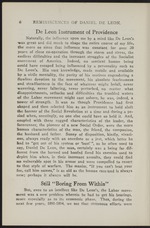 |
“...bust as he often used to
say, Daniel De Leon, the man, certainly was a being far dif-
ferent from the horned and hoofed fiend his enemies used to
depict him when, in their incessant assaults, they could find
ao vulnerable spot in his armor and were compelled to resort
to that style of warfare. The maxim, If you cant beat your
foe, call him names, is as old as the human race rand is always
new; perhaps it always will be.
Still Boring From Within*
But, even to an Intellect like De Leons, the Labor move-
ment was a new problem wherein he had to get his bearings,
more especially as to its economic phase. Thus, during the
aejst few years, 1891-1894, we see that strenuous efforts were...”
|
|
| 3 |
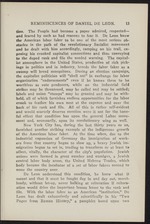 |
“...if he knows them to be
worthless as vote producers, while on the industrial field
strikes may be threatened, may be called and may be settled;
labels and union stamps may be granted and may be with-
held, all of which furnishes endless opportunities for the labor
crook to feather his own nest at the expense and over the
hack of his rank and file. All of this is rather self-evident
and would scarcely deserve mention were it not for the bane-
ful effect that condition has upon the general Labor move-
ment and, necessarily, upon its revolutionary wing as well.
New York City has, during the last thirty years or so,
furnished another striking example of the indigenous growth
of the American labor faker. At the time when, due to the
industrial expansion of Germany the immigration of work-
ers from that country began to slow up, a heavy Jewish im-
migration began to set in, tending to transform or at least to
affect, vitally, the character of the citys population. Jewish
onions were formed in...”
|
|
| 4 |
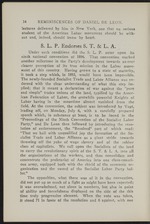 |
“...14 REMINISCENCES OF DANIEL DE LEON.
lectures delivered by him in New York, one that no serious
student of the American Labor movement should be with-
out and, indeed, should know by heart.
S. L. P. Endorses S. T. & L. A.
Under such conditions did the S. L. P. enter upon its
ninth national convention of 1896. That convention marked
another milestone in the Partys development towards an ever
clearer perception of its true mission in the Labor move-
ment of this country. Having grown to a state of maturity,
it took a step which, in 1893, would have been impossible.
The newly-founded Socialist Trade and Labor Alliance was en-
dorsed with the clear understanding of what this step im-
plied; that it meant a declaration of war against the "pure
and simple trades unions of the land, typified by the Amer-
ican Federation of Labor, the erstwhile powerful Knights of
Labor having in the meantime almost vanished from the
field. At the convention, the subject was introduced by Vogt,
leading off, on Monday...”
|
|
| 5 |
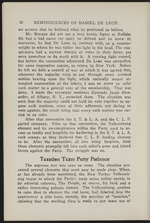 |
“...he was rather too light in the head. The con-
spirators had a narrow margin of votes in their favor, yet
were powerless to do much with it. A running fight ensued,
but before the convention adjourned De Le*n was compelled,
for some imperative reason, to return to New York. Before
he left we held a council of war at which it was agreed that,
whenever the majority tried to put through some crooked
motion bearing upon the fight, which naturally meant at-
tempted exoneration of the fakers, I was to move to refer
such matter to a general vote of the membership. That was
done. I made the necessary motions; Comrade Jacob Alex-
ander, of Albany, N. Y., seconded them. The situation was
such that the majority could not hold its vote together to op-
pose such motions, some of their adherents not daring to
vote against, the result being that every such motion was car-
ried to so refer.
After that convention the S. T. & L. A. and the C. L. F.
parted company. Prior to that convention, the Volkszeitung...”
|
|
| 6 |
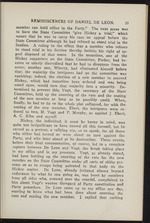 |
“...REMINISCENCES OF DANIEL DE LEON. 33
member can hold office in the Party. The next move was
to have the State Committee "give Hickey a trial, which
meant that he was to carry his case on appeal before the
State Committee although he had refused to stand trial in the
Section, A ruling to the effect that a member who refuses
to stand trial in his Section thereby forfeits his right of ap-
peal disposed of that move. In the meantime, one of the
Hickey supporters on the State Committee, Forker, had be-
come so utterly discredited that he had to disappearfrom the
scene; another one. Wherry, had eliminated himself before
that; the majority the intriguers had on the committee was
vanishing; indeed, the election of a new member to succeed
Hickey, which had meantime been ordered and was being
voted upon, would turn that majority into a minority. De-
termined to prevent this, Vogt, the secretary of the State
Committee, held up the counting of the vote and the seating
of the new member as long as he...”
|
|
| 7 |
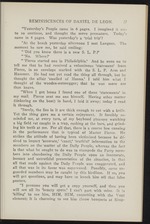 |
“...REMINISCENCES OF DANIEL DE LEON.
77
o/
Yesterdays People came in 6 pages. I imagined it \va^
to so continue, and thought the move premature. Todays
came in 4 pages. Was yesterdays a trial trip?
At the beach yesterday afternoon I met Langner. The
moment he saw me, he said smiling:
Did you know there is a new S. L. P.?
No. Where?
Pierce started one in Philadelphia. And he went on to
tell me that he had received a voluminous statement from
Pierce, in an envelope marked with the S. L. P. Arm and
Hammer. He had not yet read the thing all through, but he
thought the affair smelled of Hanna. I told him what I
thought of the wooden-nutmegger; that he was more ass
than knave.
When I got home I found one of these statements in
my mail. Pierce sent me one himself. Having other matter
(tinkering on the boat) in hand, I laid it'away; today I read
it through.
Surely, the lies in it are thick enough to cut with a knife.
Yet the thing gave me a certain enjoyment. It forcibly re-
minded me, at every turn...”
|
|
| 8 |
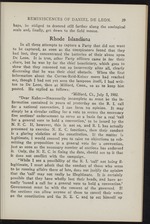 |
“...field mouse.
Rhode Islandiana
In all these attempts to capture a Party that did not want
to be captured, as soon as the conspirators found that they
had lost, they concentrated the batteries of their abuse upon
De Leon. It is true, other Party officers came in for their
, share, but he was by far the chief beneficiary, which goes to
show that they reasoned not so incorrectly after all, clearly
discerning that he was their chief obstacle. When the first
information about the Curran-Reid-Keiser move had reached
me, though I had not yet seen the lampoon itself, I had writ-
ten to De Leon, then at Milford, Conn., so as to keep him
posted. He replied as follows:
Milford, Ct, July 5, 1902.
Dear Kuhn:Necessarily incomplete as must be the in-
formation contained in yours of yesterday on the R. I. call
for a national convention, I can form no opinion. It may
simply be a circular calling for a vote to secure the necessary
five sections endorsement to serve as a basis for a real call
for a general...”
|
|
| 9 |
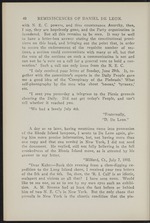 |
“...yesterday a telegram to the Picnic grounds
cheering the Daily. Did not get todays People, and cant
tell whether it reached you.
We had a lovely July 4th.
Fraternally,
D. De Leon.
day or so later, having meantime eome into possession
cf the Rhode Island lampoon, I wrote to De Leon again, giv-
ing him more precise information, but, not having more than
one copy and that one needed in New York, I did not send
the document. He replied, still not fully believing in the full
crookedness of the Rhode Island move, as is attested by his
answer to my letter.
Milford, Ct., July 7, 1902.
Dear Kuhn;Back this evening from a clam-digging ex-
pedition to the Long Island shore, I received your two letters
of the 5th and the 6th. So, then, the R. I. Call is as idiotic,
malapert and vicious as all that? I have seen none. Would
like to see one, so as to see by my own eyes such an exhibi-
tion. A. M. Simons had at least the fact before or behind
him of two N. E. C.s in New York. But the only ehaos that
prevails in...”
|
|
| 10 |
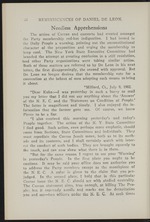 |
“...that I did not say anything about the Answer
of the N. E. C. and the Statement on Condition of People.
The latter is magnificent and timely. I also enjoyed the in-
formation that the former gave me. Of course, we knew
Pierce to be a liar.
I also received this morning yesterdays and todays
People together. The action of the N. Y. State Committee
I find good. Such action, even perhaps more emphatic, should
come from Sections, State Committees and individuals. They
must repudiate the Curran Jesuit move, both as to its meth-
ods and its contents, and I shall certainly watch with inter-
est the conduct of such bodies. They are brought squarely to
the touch, and can now show what there is in them.
But for the same reason I regret to see your Warning*
in yesterdays People. In the first place you ought to be
cautious. It may be said your office does not authorize you
to address the Party members except as the mouthpiece of
the N. E. C. A color is given to the claim that you pre-
judged. In the second...”
|
|
| 11 |
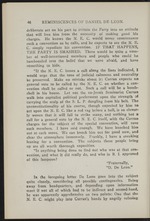 |
“...into capitalist political preferment upon the strength of
carrying the scalp of the S. L. P. dangling from his belt. The
unconstitutionality of his course, though expected by him to
act upon the N. E. C. like a red rag before a bull, is so clever-
ly woven that it will fail to strike many, and nothing but a
call for a general vote by the N. E. C. itself, with the Curran
charges for the subject of the special convention, will save
such members. I have said enough. We have knocked him
out at each move. We can knock him out for good now, and
clear the atmosphere immensely. Frankly, I have a sneaking
leaning for a convention. The subjects these people bring
up are all worth thorough exposition.
"Is anything being done to find out who was at that con-
vention, and what it did really do, and who in R. I. approved
of this lampoon?
Fraternally,
D. De Leon.
In the foregoing letter De Leon goes into the subject
quite closely, considering all possible contingencies. Being
away from headquarters, and...”
|
|
| 12 |
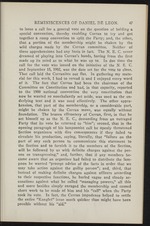 |
“...Curranites out flat. In gathering my mate-
rial for this work, I had to reread it and I enjoyed every word
of it. The fact that Curran had been the chairman of the
Committee on Constitution and had, in that capacity, reported
to the 1900 national convention the very constitution that
now he wanted so nonchalantly set aside, was used as the un-
derlying text and it was used effectively. The other appre-
hension, that part of the membership, or a considerable part,
might be shaken by the Curran move, was equally without
foundation. The brazen effrontery of Curran, first, in that he
set himself up as the N. E. C., demanding from an outraged
Party that its vote be returned to "him; second, that in the
Opening paragraph of his lampoonist call he openly threatened
Section organizers with dire consequences if they failed to
circulate his production, saying, literally, that "failure on the
part of any such person to communicate this statement to
the Section and to furnish it to the members of the...”
|
|
| 13 |
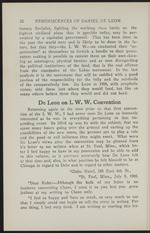 |
“...few. De Leon in 1908, with prophetic
vision, told them just where they would land, but like so
many others before them they would and did not heed.
Dc Leon on I. W. W. Convention
Returning again to the time prior to that first conven-
tion of the I. W. W., I had never seen De Leon so intensely
interested as he was in everything pertaining to that im-
pending event. So filled up was he with the subject, that we
spent many hours going over the ground and casting up the
possibilities of the new' move, the persons apt to play a role
and the good or evil influence they might exert. What were
De Leons views after the convention may be gleaned from
h's letter to me written when at St. Paul, Minn., which let-
ter I feel happy to have in my possession and be able to add
to this volume, as it portrays accurately how De Leon felt
at that time and, also, in what position he felt himself to be at
Chicago in regard to Debs and in regard to other matters.
Globe Hotel, 260 East 6th St.,
"St. Paul, Minn...”
|
|
| 14 |
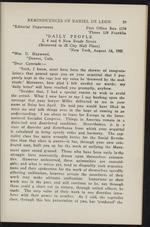 |
“...in the hope of coming to an
understanding. I am about to leave for Europe to the Inter-
national Socialist Congress. Things in America remain in a
disturbed and disordered condition. Nevertheless, it is a
state of disorder and disturbance from which your acquittal
IS calculated to bring speedy order and harmony. The cap-
italist class has again wrought better for the Social Revolu-
tion than that class is awareit has, through your now cele-
brated case, built you up for the work of unifying the Move-
ment upon sound ground. Those who have been early in the
struggle have necessarily drawn upon themselves animosi-
ties, However undeserved, these animosities are unavoid-
able, and what is worse yet, tend to disqualify such organiza-
tions and their spokesmen for the work of themselves speedily
effecting unification, however certain the soundness of their
work may make ultimate unification. Important as their
work was in the past, and will continue to be, not through
them could a short cut to...”
|
|
| 15 |
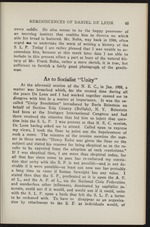 |
“...I had worked together caused me to
^*if matter of importance. It was the so-
called Unity Resolution introduced by Boris Reinstein on
behalf of Section Erie County (Buffalo), N. Y. Reinstein
had been at the Stuttgart International Congress and had
there received the stimulus that led him to inject that ques-
non into the S. L. P. I was present at that N. E. C. session,
De Leon having asked me to attend. Called upon to express
my views, I took the floor to point out the hopelessness of
such a move. The minutes of the session mention the mat-
ter in these words: Henry Kuhn was given the floor on the
subject and stated his reasons for being skeptical as to the re-
sults to be expected from the adoption of such resolutions.
\^'^^P.tcal then, I am more than skeptical today, for
all that has since come to pass has re-enforced my convic-
tion that unity with the S. P. is not possible-and is not de-
sirable If It were possible-at least not now nor for probably
a long time to come if human foresight...”
|
|
| 16 |
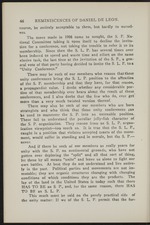 |
“...66 REMINISCENCES OF DANIEL DE LEON.
course, be entirely acceptable to them, but hardly to oursel-
yes.
The move made in 1908 came to naught, the S. P. Na-
tional Committee taking it upon itself to decline the invita-
tion for a conference, not taking the trouble to refer it to its
membership. Since then the S. L. P. has several times over
been induced to spend and wa.ste time and effort on the same
elusive task, the last time at the invitation of the S. P., a gen-
eral vote of that party having decided to invite the S. L. P. toa
Unity Conference."
There may be such of our members who reason that these
unity conferences bring the S. L. P. position to the attention
of the S. P. membership and that they have, for that reason,
a propagandist value. I doubt whether any considerable por-
tion of that membership ever hears about the result of these
conferences, and I also doubt that the few who do, ever get
more than a very much twisted version thereof.
There may also be such of our members who...”
|
|
| 17 |
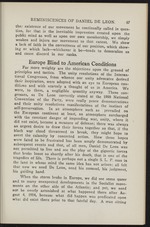 |
“...be frustrated has been amply demonstrated by
subsequent events and that, of all men, Daniel De Leon was
Tt?gigantic forces
that broke loose so shortly after his death, that is one of the
tragedies of life. There is perhaps not a single S. L. P. man in
the land in whose mind the same idea has not arisen- all felt
that now we need De Leon, need his counsel, his jiidgment.
his guiding hand.
When the storm broke in Europe, we did see some queer
and to many unexpected developments in the Socialist move-
ments on the other side of the Atlantic; and yet, we need
not be overly astonished at what happened there after A-
iaPPen was predicated upon
what did exist there prior to that fateful day. A man sitting...”
|
|
| 18 |
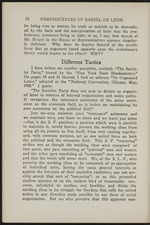 |
“...squarely upon the evolutionary
theory would impart to his effort? WHY?
Different Tactics
I have before me another pamphlet, entitled: The Social-
ist Party, issued by the "New York State Headquarters.
On pages 10 and 11 thereof, I find an address To Organized
Labor, adopted at the National Convention, Chicago, May,
1908. I quote;
The Socialist Party does not seek to dictate to organiz-
ed labor in matters of internal organization and union policy.
It recognizes the necessary autonomy of the union move-
ment on the economic field, as it insists on maintaining its
own autonomy on the political field.
Just soyou maintain your necessary autonomy and
we maintain ours, you leave us alone and we leave you alone
that is the S. P. position; a position which, were it possible
to maintain it, would forever prevent the working class from
using all its powers to free itself, from ever coming together
and, with common purpose, act as one united force on both
the political and the economic field. This S....”
|
|
| 19 |
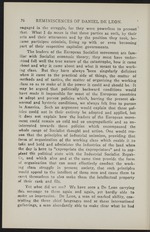 |
“...of organizing the working
class so as to make of it the power it could and should be. It
may be argued that politically backward conditions would
have made it impossible for most of the European countries
ta adopt and pursue policies which, barring the present ab-
normal and hysteric conditions, we always felt free to pursue
in America. Such an argument would explain that these pol-
icies could not in their entirety be adopted and applied, but
it does not explain how the leaders of the European move-
ment could remain so cold and so unsympathetic and so un-
interested towards these policies which encompassed the
wfiole range of Socialist thought and action. One would rea-
son that the principles of industrial unionism, providing that
form of organization of the working class which enable it to
take and hold and administer the industries of the land when
the day is here to expropriate the expropriators" and to sup-
plant the political state with the Industrial Socialist Repub-
iic, and which...”
|
|
| 20 |
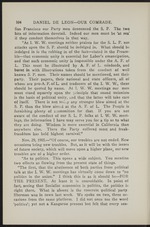 |
“...The People is
furnishing plenty of ammunition for that. If you are not
aware of the conduct of our S. L. P. folks at I. W. W. meet-
ings, the information I have may serve you for a tip as to what
they are doing. Wisdom is more essential in California than
anywhere else. There the Party suffered most and freak-
frauddom has held highest carnival.'
Nov. 29, 1905.Of course, our troubles are not ended. New
occasions bring new troubles. But, as it will be with the issues
of future society, which will move upon a higher plane, our new
troubles are of a higher order.
As to politics. This opens a wide subject. You mention
two effects as flowing from the present state of things.
The first, that the abstinence of both parties from political
talk at the I. W. W. meetings has virtually come down to no
politics in the union. I think this is as it should be^FOR
THE PRESENT. At least it is unavoidable. In point of
fact, seeing that Socialist economics is politics, the politics is
right there. What is absent...”
|
|
